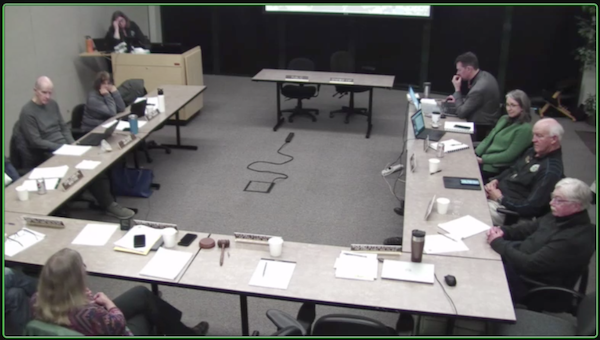
WDFW Commission To Send Out Draft Conservation Policy For Comment
Red flags – by admission, the Washington Fish and Wildlife Commission’s latest draft Conservation Policy for itself, WDFW and the agency’s various advisory groups comes with many of ’em.
“There’s hot buttons in every single paragraph,” acknowledged one of its chief architects Thursday afternoon about the document that’s been in the works for two years and undergone at least 14 official iterations – so far.

Chair Barbara Baker also urged her fellow member of the commission’s Big Tent Committee at the moment, John Lehmkuhl, to push it forward to the full body and given his apparent eager support to do just that, it appears that after a light edit from WDFW the proposed policy will soon go out for public comment. Commissioners Tim Ragen and Lorna Smith also expressed interest in moving it forward yesterday, and there were no real objections Friday morning from the full commission.
The current two-and-a-quarter-page draft (down from as much as nine, per Baker) sets out the backdrop of the new policy’s need – WDFW conserves fish and wildlife and that “responsibility is becoming increasingly difficult with the amplified effects of climate change, increasing human population and development resulting in fragmented or lost habitat, invasive species, and increasing disease.”
Action needs to be taken now while there are still “building blocks for success,” and that roadmap is WDFW’s 25-year Strategic Plan. But Baker notes that that plan uses the word “conservation” 44 times without defining it.
So, WDFW Director of Conservation Policy Jeff Davis and former Commissioner Fred Koontz set out in 2021 to do just that. Koontz may be gone – he resigned and is now an advisor to Wildlife For All, which is campaigning to reform state fish and wildlife management – but their latest attempt at defining conservation appears to have looped back to their first one:
September 2021:
Conservation: Science-informed actions to preserve the health and resiliency of natural environments, safeguard the intrinsic values of non-human nature, and provide equitable benefits to current and future generations of people and species. These actions include protecting and restoring air, soil, water, biological diversity, ecosystem processes and evolutionary potential.
March 2023
Conservation – Science informed actions to preserve the health and resiliency of natural environments including fish, wildlife and humans, safeguard the intrinsic value of nature, and provide equitable benefits to current and future generations of human and non-human life. These actions include protecting and restoring air, soil, water, biological diversity, ecosystem processes and evolutionary potential.
With two of the 2021 draft’s chief skeptics – former Commissioners Kim Thorburn and Don McIsaac – both now excised from the debate and decisions, having either not been reappointed to the commission by the Governor’s Office or resigned in disgust after one term and because they stood a zero-point-zero-zero-percent chance of a second, or both, it fell to hunter- and fisherman-friendly Commissioner Jim Anderson to speak out yesterday.
“What is ‘safeguard the intrinsic value of nature, and provide equitable benefits to current and future generations of human and non-human life’?” the Buckley resident and retired executive director of the Northwest Indian Fisheries Commission wanted to know.
He also inquired if a “scrub” had been done of commission and WDFW functions as applied to that proposed definition. The commission sets policy; the agency manages.

“In terms of red flags, you pretty much hit one of them that we expect to be a red flag and we expect to get a lot of attention,” acknowledged Baker about the intrinsic values and equitable benefits phrasing.
But given the wide usage of the term conservation, she said it was about coming up with a “shared definition.”
In going to lengths to defend the draft and move it forward, Baker said she didn’t want to see it watered down with more ambiguous language before public review and noted that it is also quiet on some of the “big tension points that are out there.”
“Who is the first conservationist or who is the most conservationist or who pays for conservation or who should be listened to,” she stated. “We purposely decided to set that aside, because all that does is give people something to argue about. It kind of missed the point, and the point is we need to figure out what it is and where we’re going and what we’re trying to do. So this is not a winners or losers thing.”
Maybe so, but that purposeful decoupling – or at best, nonacknowledgement – of conservation from hunting and fishing and the tremendous benefits achieved through the North American Model of Wildlife Conservation and federal excise taxes on gear is troubling and will surely be a flashpoint during public review. It follows some who are purposefully trying to downplay or deny that critically important linkage, including the executive director of Wildlife For All.
This latest draft also strips out “public policy,” “management actions” and “extrinsic (social, economic, and cultural) values of fish and wildlife resources” from the definition of conservation in a draft posted in January 2023.
Public policy could refer to the state legislature’s mandate to the commission and WDFW to preserve critters and provide recreational opportunities. However, that is touched on elsewhere in the document, in a “Principles” section that also would fold in a stronger precautionary principle.
But while WDFW has its own “Conservation Principles,” Policy 5004, the end of this latest Fish and Wildlife Commission draft reads, “The foregoing policy, including its guiding principles, shall be incorporated by the WDFW in the development and approval of the budget, planning, management and decision-making processes.”
Baker reiterated that phrasing yesterday and said the commission wants to now hear from all sides. She said it’s time to, like she said Anderson would say, “fish or cut bait … just do it and see what comes back.”
This morning she also indicated she was in no hurry to finalize the new policy – she was recently reappointed to the commission for six more years – and she wanted to “do it right.”
She said Nate Pamplin, the agency’s policy director, will be asked to get it out to a wider audience than a usual commission policy might otherwise attract, as well as incorporate a WDFW staff response piece.
Correction: 2:50 p.m., March 17, 2023: Jeff Davis’s last name and title were hopelessly garbled in the initial version of this blog, in which he was referred to as Jeff Anderson and WDFW Conservation Director. Jeff Davis is in fact WDFW’s Director of Conservation Policy.

